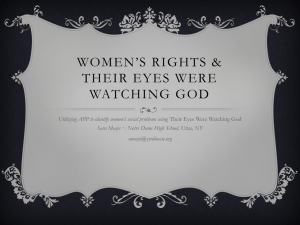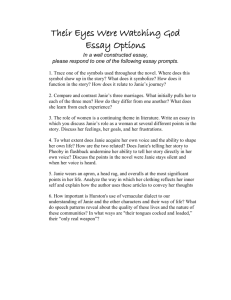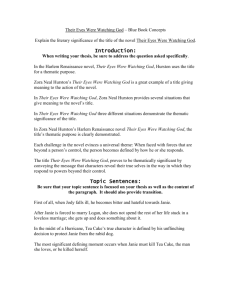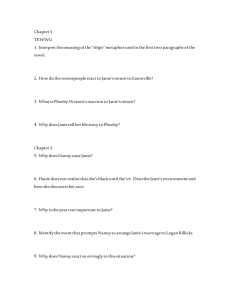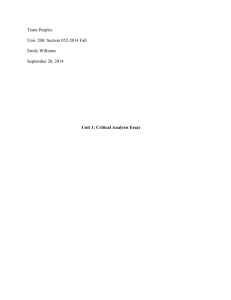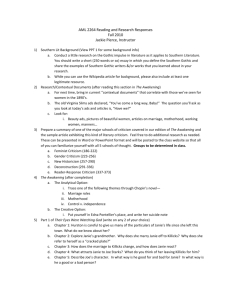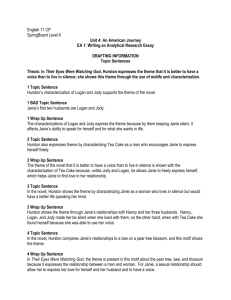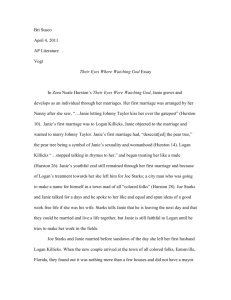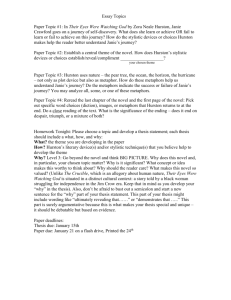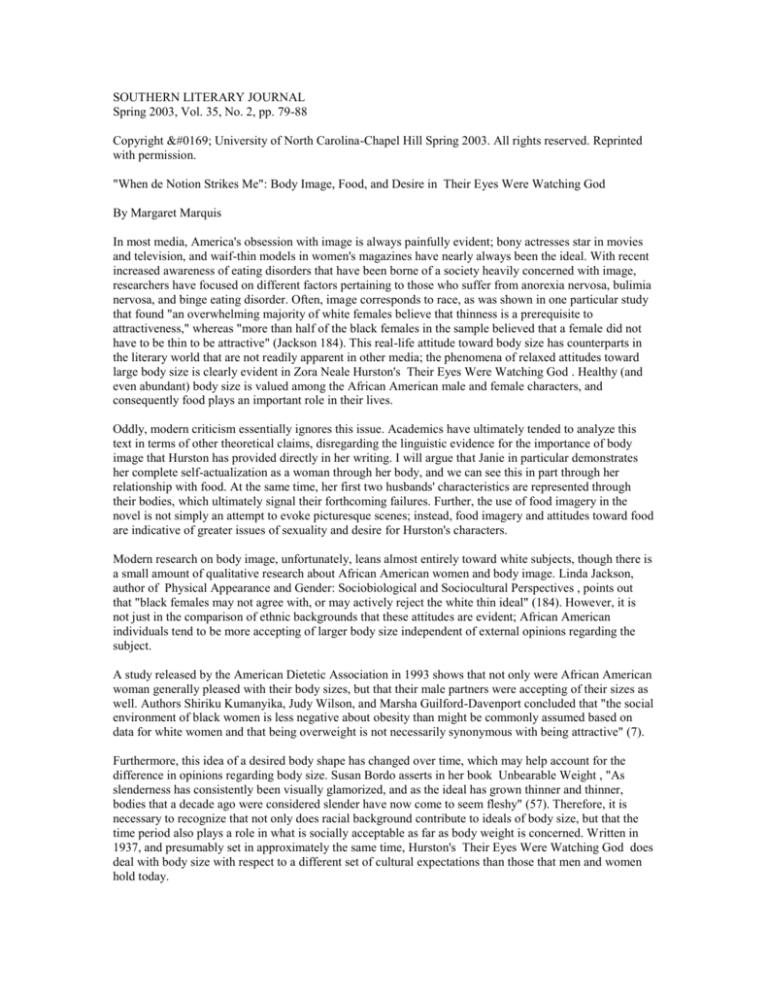
SOUTHERN LITERARY JOURNAL
Spring 2003, Vol. 35, No. 2, pp. 79-88
Copyright © University of North Carolina-Chapel Hill Spring 2003. All rights reserved. Reprinted
with permission.
"When de Notion Strikes Me": Body Image, Food, and Desire in Their Eyes Were Watching God
By Margaret Marquis
In most media, America's obsession with image is always painfully evident; bony actresses star in movies
and television, and waif-thin models in women's magazines have nearly always been the ideal. With recent
increased awareness of eating disorders that have been borne of a society heavily concerned with image,
researchers have focused on different factors pertaining to those who suffer from anorexia nervosa, bulimia
nervosa, and binge eating disorder. Often, image corresponds to race, as was shown in one particular study
that found "an overwhelming majority of white females believe that thinness is a prerequisite to
attractiveness," whereas "more than half of the black females in the sample believed that a female did not
have to be thin to be attractive" (Jackson 184). This real-life attitude toward body size has counterparts in
the literary world that are not readily apparent in other media; the phenomena of relaxed attitudes toward
large body size is clearly evident in Zora Neale Hurston's Their Eyes Were Watching God . Healthy (and
even abundant) body size is valued among the African American male and female characters, and
consequently food plays an important role in their lives.
Oddly, modern criticism essentially ignores this issue. Academics have ultimately tended to analyze this
text in terms of other theoretical claims, disregarding the linguistic evidence for the importance of body
image that Hurston has provided directly in her writing. I will argue that Janie in particular demonstrates
her complete self-actualization as a woman through her body, and we can see this in part through her
relationship with food. At the same time, her first two husbands' characteristics are represented through
their bodies, which ultimately signal their forthcoming failures. Further, the use of food imagery in the
novel is not simply an attempt to evoke picturesque scenes; instead, food imagery and attitudes toward food
are indicative of greater issues of sexuality and desire for Hurston's characters.
Modern research on body image, unfortunately, leans almost entirely toward white subjects, though there is
a small amount of qualitative research about African American women and body image. Linda Jackson,
author of Physical Appearance and Gender: Sociobiological and Sociocultural Perspectives , points out
that "black females may not agree with, or may actively reject the white thin ideal" (184). However, it is
not just in the comparison of ethnic backgrounds that these attitudes are evident; African American
individuals tend to be more accepting of larger body size independent of external opinions regarding the
subject.
A study released by the American Dietetic Association in 1993 shows that not only were African American
woman generally pleased with their body sizes, but that their male partners were accepting of their sizes as
well. Authors Shiriku Kumanyika, Judy Wilson, and Marsha Guilford-Davenport concluded that "the social
environment of black women is less negative about obesity than might be commonly assumed based on
data for white women and that being overweight is not necessarily synonymous with being attractive" (7).
Furthermore, this idea of a desired body shape has changed over time, which may help account for the
difference in opinions regarding body size. Susan Bordo asserts in her book Unbearable Weight , "As
slenderness has consistently been visually glamorized, and as the ideal has grown thinner and thinner,
bodies that a decade ago were considered slender have now come to seem fleshy" (57). Therefore, it is
necessary to recognize that not only does racial background contribute to ideals of body size, but that the
time period also plays a role in what is socially acceptable as far as body weight is concerned. Written in
1937, and presumably set in approximately the same time, Hurston's Their Eyes Were Watching God does
deal with body size with respect to a different set of cultural expectations than those that men and women
hold today.
Much evidence throughout Hurston's work demonstrates the importance of body image for her characters.
Interestingly, Hurston seems to place more value on body size for her male characters than for her female
characters. This valuation is seen continuously in Janie's second husband, Joe. The first description of their
life together depicts how Janie immediately recognizes Joe's physical appearance as something to desire,
even to respect. On the train to Eatonville, she "took a lot of looks at him and she was proud of what she
saw. Kind of portly like rich white folks" (32). Janie is pleased with the knowledge that others will see Joe's
larger size as she sees it: an (in)direct sign of well-being, financial stability (a large body size implies that
Joe makes enough money to feed himself well), and general good health.
When Joe becomes mayor, his ample figure further functions as a sign of his power and potency in the
town. Readers see evidence of Joe's bodily influence through the actions of the other characters. In one
scene, Janie watches Hezekiah emulating the late Mr. Starks: "Every chance he got he was reared back in
Joe's swivel chair trying to thrust out his lean belly into a paunch" (88). This scene illustrates how Joe's
copious figure was a significant display of his power over others and how these same people attempted to
reproduce it in themselves, perhaps to enforce the same authority over their peers that Joe had over them.
Joe's power, however, is not permanent--nor is his commanding size. Joe eventually begins to suffer from
back trouble, which results in loss of weight and the first indication that Joe is no longer the great and
giving man he once was. Noting that "the more his back ached and his muscle dissolved into fat and the fat
melted off his bones, the more fractious he became with Janie," Hurston directly equates Joe's body size
with his deplorable behavior to his once-cherished wife (74). Furthermore, it hardly seems like a
coincidence that shortly after Janie publicly humiliates Joe and robs him of his perceived power, his health
and his physical appearance decline even more. By insulting him in front of his peers, "Janie had robbed
him of his illusion of irresistible maleness that all men cherish" (75). In her book Hitting a Straight Lick
With a Crooked Stick , Susan Edwards Meisenhelder explains the significance of this scene: "As Janie's
final allusion to sexual impotence sugge!
sts, it is an empty model of male identity, for Joe's illusions of masculinity and power are immediately
destroyed when Janie refuses to play her supporting role" (68). Janie has, through reducing Joe's perceived
power, succeeded in promoting her own burgeoning independence.
It is at this point that Hurston makes audiences truly aware of the power of a bountiful physique in the
African American community. She writes, "Through the thin counterpane [Janie] could see what was left of
his belly huddled before him on the bed like some helpless thing seeking shelter" (80). This description
emphasizes a diminishment not only of Joe's health, but also his once omnipotent existence in Eatonville;
as he becomes physically smaller, he also loses the power with which he once held the town. This change
proves crucial for Janie's development, as Christine Levecq points out:
We laugh because Janie is suddenly toppling the image of a god and is without any transition switching the
keys from the solemn to the familiar; because she is doing this in a typically carnivalesque way, by
undressing the character with the big voice and exposing his contrasting impotence, she thereby also
reverses the power relationship. (88)
Janie is now in charge, and Joe's body and power are left to wither away and die. With Joe's overpowering
presence diminished and eventually erased, Janie becomes free to express her own power that has been thus
far suppressed.
It must be noted that, in spite of the positive associations Hurston makes with greater body weight in men,
there are limits as to what the women will find acceptable in terms of not only body size but also body
composition for men. When Joe's death is near, Janie first notes his loss of muscle, which made up the
majority of his bulk; she is proud of his body size when it is mostly muscle. However, there is evidence that
large body size in men, when composed of fat, is not as acceptable when Janie discusses her first husband
Logan with her grandmother. She complains, "[Logan's] belly is too big, too, now," and notes that she hates
the fat on the back of his neck (23). Janie implies through the use of the words "too" and "now" that there
was a large body size she found permissible for Logan; he has simply exceeded it at this point. Men are
valued for their size when it represents power, as with Joe, but not necessarily when it reflects gluttony or
laziness, as with Logan.
While the importance of body size for men is certainly evident in this novel, the importance of body size
for women, and specifically Janie, is both obvious and quite important to a greater understanding of Janie
and her progression to womanhood. Little academic research had focused on this phenomenon. For
example, Sally Ann Ferguson examines Janie's growth in terms of her relationships with her lovers; indeed
it is an important facet of Janie's self-empowerment, but it also fails to describe Janie as a powerful being
independent of her men. This opinion is common--Janie is too often regarded as a woman in relationships
with men as opposed to being given her proper due as a self-reliant woman.
A substantial body weight is desirable among Hurston's female characters, an attitude that is (according to
research) paralleled by modern standards. Dr. Ruth Striegel-Moore, associate professor of Psychology at
Wesleyan University, says, "The black community is somewhat more accepting of slightly larger body
sizes" (qtd in Pinkowish 1). This limited attitude toward body size is evident when one compares Tea
Cake's rejection of a woman with an extreme body size at his macaroni dinner to the admiration the men of
Eatonville have for Janie's ample (but not exceptional) body size. The appreciative looks from the men as
Janie is walking home at the beginning of the novel are supportive of this idea: "The men noticed her firm
buttocks like she had grape fruits in her hip pockets...then her pugnacious breasts trying to bore holes in her
shirt" (Hurston 2). It is in this manner that the readers are informed that the favored female physiology in
this African American community is a !
substantial and healthy one.
In spite of this positive reaction, some critics interpret this event as not only negative, but even offensive to
Janie. William Ramsey attaches a negative stigma to this scene: "Here in a very probing, ambivalent frame,
men notice Janie's buttocks, hair, and breasts--her parts rather than her person" (42). He further claims that
Janie is upset by the attention when she walks through town: "She surely feels the strain of men's eyes
boring at her in possessive desire and mounting resentment at her unavailability" (43). It is precisely this
sort of interpretation that prohibits readers from recognizing that Janie's body is an asset to her power as a
woman, much like Joe's potency was established through his body size so that he was unafraid to show off
his physical size and that he indeed wanted people to notice.
I would argue that this significant event has its primary strength independent from the valuation that the
men of Eatonville express toward Janie's physical appearance; as Janie walks back into town, she is a
complete, proud woman, unashamed of herself or her actions. She knows that the men are watching and she
wants them to see her. The women note Janie's confident potency with wariness after she passes the men:
"The women took the faded shirt and muddy overalls and laid them away for remembrance. It was a
weapon against [Janie's] strength and if it turned out of no significance, still it was a hope that she might
fall to their level some day" (Hurston 2). The women notice this power and pray that some misfortune
might befall her to reduce her to their level; for now, Janie is a giant with the power of a king and ten times
the strength of any man watching her. As Janie's breasts and buttocks protrude, her body is forcing itself
upon the world whether it likes it or not.
This is quite different from Janie's previous situation in which she was expected to cover or be ashamed of
her physical presence. For example, Joe makes her cover her hair, which symbolizes his attempts to stifle
her and keep her under constraints in other ways. Bertram Ashe notes the conflict between Janie's desire to
be seen and Joe's desire to cover her as an important negotiation of acceptable beauty between African
American men and women. Furthermore, he points out the importance of Janie letting her hair down after
Joe's death, as Hurston writes "[Janie] tore off the kerchief from her head and let down her plentiful hair.
The weight, the length, the glory was there" (83). Janie has reached a level of self-discovery, recognizing
that she has a physical presence of which to be proud; there is a weight and a heft to her hair, longing to be
seen by others and that will indeed be seen by others.
Tea Cake reinforces the idea of Janie's powerful physical existence when Janie wrongly accuses him of
cheating on her with Nunkie, "a little chunky girl" who worked in the field with them (130). After a fight
and eventual reconciliation, Janie asks "like a woman" if Tea Cake loves Nunkie, to which he responds:
"What would Ah do wid dat lil chunk of a woman wid you around? She ain't good for nothin exceptin' tuh
set up in uh corner by de kitchen stove and break wood over her head. You'se something tuh make uh man
forgit to git old and forgit tuh die" (132). Tea Cake tells Janie that Nunkie is not enough woman for him,
but Janie is--this reassurance helps Janie to recognize herself as an entire physical being of which to be
proud. Ultimately, as Janie walks back into Eatonville, she is able to show off her whole self, not just her
hair.
Susan Meisenhelder presents a rare nod toward this interpretation, asserting, "The frames at the...end of the
novel further suggest neither a broken nor a deluded woman....[Janie] strides into Eatonville, Hurston
suggests, a strong and vigorous woman committed to life and experience" (78). However, she does not
mention how this victory is expressed through her body. It is at this moment that Janie achieves selfrealization independent of familial or masculine influences in the forms of her grandmother or past lovers;
again, the critical literature fails to acknowledge this moment. For example, Jennifer Jordan writes, "Janie's
struggle for identity and self-direction remains stymied. She never defines herself outside the scope of her
marital or romantic involvements" (108). This statement, perhaps influenced by years of interpretation of
this novel as a negative portrayal of African American women, is quite limited. In fact, it is only after Janie
is released from the (albeit!
, often welcomed) bonds of romantic love that she is able to become fully independent as a woman.
Indeed, when Janie is free from the romantic expectation and obligation of her lovers (even the mostly
positive relationship with Tea Cake), she can live for herself. Historically, critical support for this theory is
surprisingly lacking--Janie's experiences have tended to be categorized by critics. Janice Knudsen
recognizes this problem, claiming that "Janie's quest for self-actualization moves beyond the scope of the
feminist or African-American heroine and into the realm of the heroic" (229). Janie is heroic; she has
endured, and the means by which she demonstrates this survival is through her physical being. Her body is
strong, proud, and demanding much-deserved attention for her past accomplishments. Though Janie is the
object of ferocious town gossip after the death of Tea Cake, she shows in this bold walk through town that
she is certainly not one who wants to disappear,!
hide, or go unnoticed.
Janie's romantic and sexual experiences have long been a source of aggravation for critics; the primary
reluctance to accept her as a legitimate sexual being has its roots in the literary and racial politics of the
Harlem Renaissance. At that time, African American writers were struggling to cast off the centuries-old
stereotype of the black woman as a promiscuous being, and Hurston's depiction of an African American
character who not only acknowledged but also welcomed sexual desire was thus seen as "bad press." For
example, bell hooks describes the white belief that African American women were sexually promiscuous
and points out that "sexual exploitation of black women continued long after slavery" (59), both ideas that
were held by literary critics who eagerly applied them to Their Eyes Were Watching God . I would argue,
however, that it is appropriate for Janie to be recognized as a powerful, sexual woman as opposed to an
undeveloped caricature of a wanton African Ameri!
can woman. Her struggle to achieve independence and open sexuality should be celebrated as a triumph of
the female literary character.
It is no mistake that Janie's first sexual experience occurs through the imagery of the pear tree; Janice
Daniel emphasizes that "Hurston's rich organic imagery contributes in a significant way to our
understanding of the heroine's own role in either advancing or impeding her quest. Janie's innate tendency
to respond to nature--her desire to be natural--is reflected throughout the story as she interprets her
emotional world through contact with the physical world" (75). Janie's quest is to become a mature woman
in the world, a quest she initiates the moment she lets herself sit beneath the blossoming pear tree. The tree
and its eventual fruit will nourish and feed people, as they are the catalyst for Janie's journey of selfrealization as a capable woman. Thus, food has an auspicious initial role in the novel; the pear tree causes
her to "behold a revelation" (Hurston II). This revelation, the burgeoning sensuality and sexuality in her
three romances, is triggered by food an!
d will continue to mature in images of food throughout the novel. Donald Marks explains, "To the
passionate relationships, Hurston attaches metaphors of natural fertility and sexuality, whereas she
associates control relationships with physical deformity, decay, and technological, non-sexual productivity"
(152). Indeed, Janie's relationship with Tea Cake is expressed through sensual depictions of food; for
example, even his name is indicative of something sweet and desirable. Meanwhile, Janie verbally indicates
distaste for Logan's physical appearance and, eventually, Joe's as well.
With the variations in opinions of body size and representation of Janie's sexual awakening by means of the
fruit tree, it is no surprise that the African American community in Their Eyes Were Watching God also
had less exacting definitions of the relationships men and women should have with food than their white
counterparts have generally had. Susan Bordo points out that it has become a societal norm that "men sing
openly of their wild cravings [while] women's cravings are a dirty shameful secret" (129). The African
Americans in Hurston's work, however, do not hold women to these same restrictive expectations. In fact,
both Hurston's male and female characters often use food as a crucial element in the process of courting
and food, in turn, becomes a representation of sexuality and sensuality. For example, when Tea Cake hangs
around the store in an effort to woo Janie, he asks her (indirectly), "Anybody have uh Coca-Cola wid me?"
(Hurston 97). Although Janie turns his of!
fer away because she has already had one, Tea Cake still expects her to have another. For Janie to refuse
would be the same as refusing Tea Cake personally. When they begin to spend more time together, Tea
Cake becomes more confident in the relationship, and he brings Janie some fish; Hurston writes, '"Ah'll
clean 'em, you fry 'em and let's eat,' he said with the assurance of not being refused" (99). For Tea Cake,
there is no longer a possibility that Janie will reject him by turning away his food. Hurston and her
characters recognize that in serious matters such as love, there is no place for holding back desires, and
food and desire are intertwined.
The same type of romantic consumption is evident earlier in the work when Joe teases Janie about her
youth; he comments that she is so young that she still likes candy. A real-life woman would have been
likely to push the idea aside in an attempt to hide any craving for food. Bordo describes the ideal woman
who "eats...without deep desire and without apparent consequence" as an ideal to which many women are
expected to adhere (102). However, Janie does not see any reason to hide her desires from Joe; she retorts
smartly to his teasing, "Ah makes and sucks 'em when de notion strikes me. Drinks sweeten' water too"
(Hurston 27). Not only does Janie openly express a craving for a food, but she also volunteers a desire for a
food that Joe does not even mention. Further, Janie's choice of the word "sucks" is not simply in reference
to food, it is also explicitly sexual and serves as a bit of sexual flirtation between Joe and her. Unlike many
women who are uneasy with their relatio!
nships with food, Janie recognizes not only the physical need to eat but also the urge to eat, and as the urge
for sexual intimacy.
Ultimately, an inability to eat at all signals the end of Tea Cake and Janie's relationship. When he contracts
rabies, Tea Cake is unable to take any food at all, and Janie recognizes that something is terribly wrong,
although neither knows yet that he has the disease. Hurston writes:
About the middle of the fourth week Tea Cake came home early one afternoon complaining of his head.
Sick headache that made him lie down for a while. He woke up hungry. Janie had his supper ready but by
the time he walked from the bedroom to the table, he said he didn't b'lieve he wanted a thing.
"Thought you tole me you wuz hungry!" Janie wailed.
"Ah thought so too," Tea Cake said very quietly and dropped his head in his hands.
"But Ah done baked yuh uh pan uh beans."
"Ah knows dey's good all right but Ah don't choose nothin' now, Ah thank yuh, Janie." (165)
That night, Tea Cake is unable to drink the water that Janie brings him. The doctor is summoned, who
diagnoses the rabies and pronounces Tea Cake's impending death from the disease, a physical death and
death of an intimate relationship both foreshadowed by a lack of desire to eat. In the numerous scenes
involving love, flirtation and food, Hurston creates a society that acknowledges food relationships as both
necessary and positive, or, in the case of Tea Cake's death, predictors of doom. It is appropriate that Janie's
life and strength are continually represented by her physical presence and awareness and also by food, the
source of human vitality. Through its unique celebration of the human body, food, and consumption, Their
Eyes Were Watching God depicts both a community in which individuals can live their lives without
feeling pressures to conform to an unrealistic ideal and a triumphant woman unashamed of her sexuality or
her physical body.
Works Cited
Ashe, Bertram. '"Why Don't He Like My Hair?': Constructing African-American Standards of Beauty in
Toni Morrison's Song of Solomon and Zora Neale Hurston's Their Eyes Were Watching God " African
American Review 25 (1995): 579-592.
Bordo, Susan. Unbearable Weight: Feminism, Western Culture, and the Body . Berkeley: U of California
P, 1993.
hooks, bell. Ain't I a Woman: Black Women and Feminism . Cambridge: South End Press, 1981.
Hurston, Zora Neale. Their Eyes Were Watching God . New York: Harper & Row, 1937.
Jackson, Linda A. Physical Appearance and Gender: Sociobiological and Sociocultural Perspectives .
Albany: State U of New York P, 1992.
Jordan, Jennifer. "Feminist Fantasies: Zora Neale Hurston's Their Eyes Were Watching God ." Tulsa
Studies in Women's Literature 7 (1988): 105-117.
Knudsen, Janice. "The Tapestry of Living: A Journey of Self-Discovery in Hurston's Their Eyes Were
Watching God " CLA Journal 40 (1996): 214-229.
Kumanyika, Shiriki, Judy Wilson, and Marsha Guilford-Davenport. "Weight-related Attitudes and
Behaviors of Black Women" Journal of the American Dietetic Association 93 (1993): 416-422.
Levecq, Christine. "'You Heard Her, You Ain't Blind': Subversive Shifts in Zora Neale Hurston's Their
Eyes Were Watching God ." Tulsa Studies in Women's Literature 13 (1994): 87-111.
Marks, Donald. "Sex, Violence, and Organic Consciousness in Zora Neale Hurston's Their Eyes Were
Watching God ." Black American Literature Forum 19 (1985): 152-157.
Meisenhelder, Susan Edwards. Hitting a Straight Lick with a Crooked Stick: Race and Gender in the Work
of Zora Neale Hurston . Tuscaloosa: U of Alabama P, 1999.
Pinkowish, Mary Desmond. "Eating Disorders: No Stereotypes Need Apply." Patient Care 29 (15 Nov.
1995): 13.
Ramsey, William. "The Compelling Ambivalence of Zora Neale Hurston's Their Eyes Were Watching
God ." Southern literary Journal 27 (1994): 36-50.

